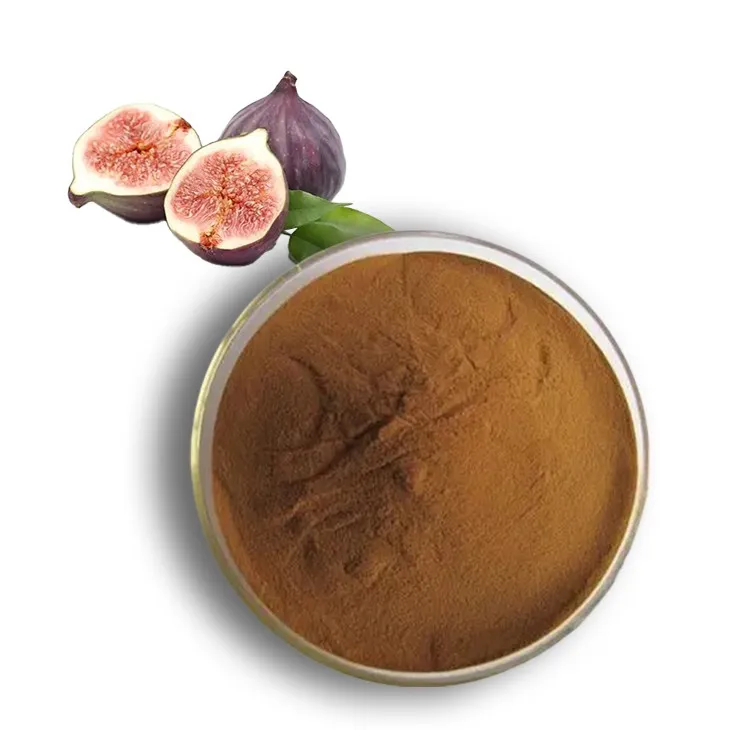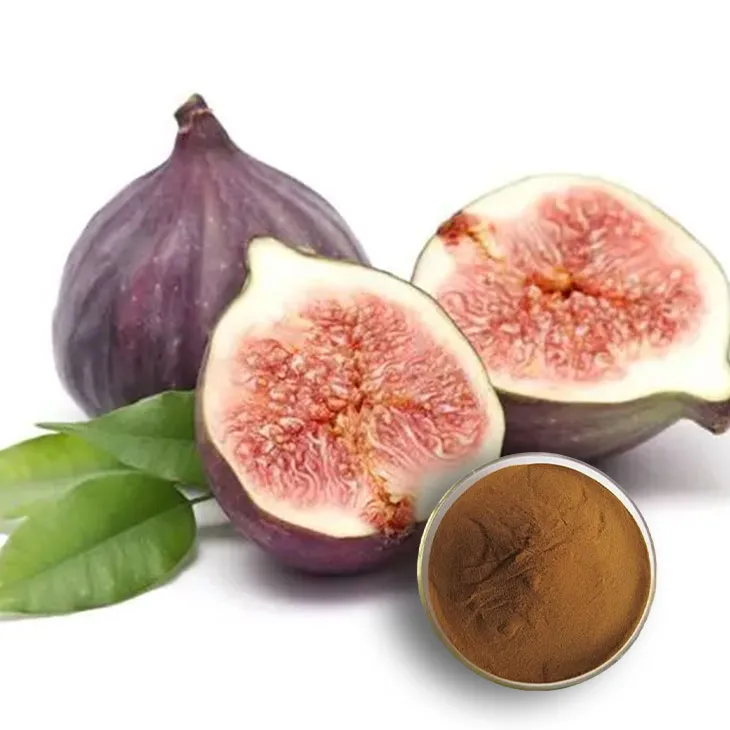- 0086-571-85302990
- sales@greenskybio.com
Use fig extracts? Make sure you source from sustainable suppliers!
2024-12-21

1. Introduction
Fig Extracts have gained popularity in various industries, including the food, cosmetic, and pharmaceutical sectors. Their unique properties, such as antioxidant and anti - inflammatory effects, make them a valuable ingredient. However, as the demand for Fig Extracts grows, it is crucial to consider the source of these extracts. Sustainable sourcing is not only beneficial for the environment but also for the long - term availability of fig products and the well - being of the communities involved in their production.

2. The Impact on Local Ecosystems
2.1. Biodiversity
Figs are an important part of many ecosystems. They are a food source for numerous animals, including birds, bats, and monkeys. When fig trees are harvested for extract production, it is essential to ensure that the harvesting methods do not harm the surrounding biodiversity. For example, if large - scale deforestation occurs to make way for fig plantations, it can lead to the displacement of native species. Sustainable suppliers should follow practices that minimize the impact on biodiversity, such as selective harvesting and maintaining natural habitats around fig trees.
2.2. Soil Health
Fig trees have a significant impact on soil quality. Their roots help to prevent soil erosion and improve soil structure. However, improper farming techniques, such as over - tilling or the use of excessive fertilizers, can degrade the soil. Sustainable suppliers use methods like organic farming and crop rotation to maintain soil health. Organic farming, for instance, reduces the use of synthetic chemicals that can contaminate the soil and water sources. Crop rotation helps to replenish soil nutrients and prevent the build - up of pests and diseases.

3. Fair Trade Practices
3.1. Workers' Rights
Many regions where figs are grown rely on manual labor for harvesting and processing. Sustainable suppliers should ensure that workers are treated fairly. This includes providing safe working conditions, fair wages, and reasonable working hours. For example, workers should be protected from exposure to harmful chemicals during the extraction process. They should also be paid a wage that allows them to support their families and have access to basic necessities. Fair trade certifications can be an indication that a supplier adheres to these principles.
3.2. Community Development
When sourcing Fig Extracts sustainably, it is also important to consider the impact on local communities. Suppliers can contribute to community development by investing in local infrastructure, such as schools and hospitals. They can also support local farmers by providing training and access to markets. For instance, a sustainable fig extract supplier might organize workshops on organic farming techniques for local growers, or help them connect with international buyers. This not only benefits the local community but also ensures a stable supply of high - quality figs for extract production.

4. Long - Term Availability
4.1. Conservation of Fig Species
Some fig species are endangered or at risk due to over - harvesting and habitat loss. Sustainable suppliers play a crucial role in the conservation of fig species. They can support initiatives such as seed banks and reforestation projects. By conserving fig species, suppliers ensure that there will be a continuous supply of figs for extract production in the future. For example, a supplier might collaborate with a conservation organization to plant fig trees in areas where they have been depleted.
4.2. Sustainable Farming Practices
Sustainable farming practices are essential for the long - term availability of fig extracts. These practices include water conservation, pest management, and genetic diversity preservation. Water is a precious resource, and fig growers should use efficient irrigation methods to reduce water waste. In terms of pest management, instead of relying solely on chemical pesticides, sustainable suppliers can use biological control methods, such as introducing natural predators of pests. Maintaining genetic diversity among fig trees helps to make the crop more resilient to diseases and environmental changes.
5. How to Make an Informed Decision
5.1. Researching Suppliers
When looking for a sustainable supplier of fig extracts, it is necessary to do thorough research. Start by looking for suppliers with recognized sustainable certifications, such as organic or fair trade certifications. Check their websites for information about their farming and harvesting practices. You can also look for reviews or testimonials from other customers. Additionally, find out if the supplier is involved in any environmental or social initiatives in the regions where they operate.
- Check for certifications like USDA Organic, Fairtrade International, etc.
- Look for information on their use of pesticides and fertilizers.
- See if they support local communities through development projects.
5.2. Considering the Supply Chain
The supply chain of fig extracts can be complex. It is important to understand how the figs are sourced, processed, and transported. A sustainable supply chain should be transparent and traceable. Suppliers should be able to provide information about the origin of the figs, the methods used for extraction, and the transportation routes. This helps to ensure that the entire process from the fig tree to the final product is sustainable.
- Ask about the origin of the figs - are they grown locally or imported?
- Find out about the extraction process - is it environmentally friendly?
- Inquire about transportation - are low - carbon methods used?
6. Conclusion
Using fig extracts can be a great choice, but it is essential to source them from sustainable suppliers. By considering the impact on local ecosystems, fair trade practices, and long - term availability, consumers and businesses can make more ethical and environmentally - friendly decisions. Through proper research and consideration of the supply chain, it is possible to find suppliers that meet these criteria and contribute to a greener and more sustainable future for the fig extract industry.
FAQ:
What are the benefits of sourcing fig extracts from sustainable suppliers?
When sourcing fig extracts from sustainable suppliers, there are multiple benefits. Firstly, it helps protect local ecosystems. Sustainable suppliers are more likely to use farming and extraction methods that have a minimal negative impact on the environment, such as reducing soil degradation and conserving water. Secondly, it often involves fair trade practices. This means that farmers and workers involved in the fig production process are paid fairly for their labor, which can contribute to the economic development of local communities. Finally, it ensures long - term availability of fig extracts. By using sustainable practices, the supply chain is less likely to be disrupted in the future due to over - exploitation or environmental degradation.
How can one identify a sustainable supplier of fig extracts?
To identify a sustainable supplier of fig extracts, one can look for several indicators. Certifications are a good start. For example, look for suppliers with organic certifications, which indicate that they follow certain environmental and farming standards. Another aspect is transparency. A sustainable supplier should be able to provide information about their sourcing practices, such as where the figs are grown, how they are harvested, and what measures they take to protect the environment. Additionally, research the supplier's reputation in the industry. Check for reviews or testimonials from other customers who have used their fig extracts and assess whether they are committed to fair trade and environmental protection.
What are the potential consequences of not sourcing fig extracts from sustainable suppliers?
If fig extracts are not sourced from sustainable suppliers, there can be several negative consequences. For the local ecosystems, it may lead to over - exploitation of fig trees, which can disrupt the natural balance. This could result in soil erosion, loss of biodiversity, and a decline in the quality of water in the area. In terms of fair trade, workers may be underpaid or exploited, which is unethical. Moreover, in the long run, non - sustainable sourcing can lead to a depletion of fig resources, making it difficult to obtain fig extracts in the future, which can also impact industries that rely on these extracts.
Are there any regulations governing the sustainable sourcing of fig extracts?
There may be some general regulations and international standards that are relevant to the sustainable sourcing of fig extracts. For example, some countries have environmental protection laws that apply to agricultural and extraction activities. Additionally, there are international fair trade certifications and standards that suppliers can adhere to. However, the specific regulations can vary depending on the region and the type of fig product. In some cases, industry - specific self - regulatory initiatives may also exist to promote sustainable sourcing among suppliers.
How does sustainable sourcing of fig extracts contribute to environmental protection?
Sustainable sourcing of fig extracts contributes to environmental protection in several ways. Sustainable suppliers often use methods that reduce the use of pesticides and fertilizers, which can have harmful effects on the soil, water, and surrounding wildlife. They may also practice agroforestry, which combines tree - growing with other agricultural activities. In the case of fig trees, this can help maintain soil fertility, provide habitats for wildlife, and contribute to carbon sequestration. Additionally, sustainable sourcing can ensure that fig extraction is done in a way that does not damage the natural growth and regeneration of fig trees, thus preserving the overall ecosystem.
Related literature
- Sustainable Sourcing in the Food Industry: A Case Study of Fig Extracts"
- "The Importance of Sustainable Suppliers for Botanical Extracts: Focus on Fig"
- "Fig Extracts and Sustainability: An Overview of Current Practices"
- ▶ Hesperidin
- ▶ citrus bioflavonoids
- ▶ plant extract
- ▶ lycopene
- ▶ Diosmin
- ▶ Grape seed extract
- ▶ Sea buckthorn Juice Powder
- ▶ Beetroot powder
- ▶ Hops Extract
- ▶ Artichoke Extract
- ▶ Reishi mushroom extract
- ▶ Astaxanthin
- ▶ Green Tea Extract
- ▶ Curcumin Extract
- ▶ Horse Chestnut Extract
- ▶ Other Problems
- ▶ Boswellia Serrata Extract
- ▶ Resveratrol Extract
- ▶ Marigold Extract
- ▶ Grape Leaf Extract
- ▶ blog3
- ▶ blog4
- ▶ blog5
-
Pure 85% Tomentil Extract.
2024-12-21
-
Artichoke Leaf Extract
2024-12-21
-
Pueraria Lobata Extract
2024-12-21
-
Tinospora cordifolia extract
2024-12-21
-
Centella Asiatica Extract
2024-12-21
-
Stevia Extract
2024-12-21
-
Beta Carotene
2024-12-21
-
Genistein
2024-12-21
-
Grapefruit Seed Extract Powder
2024-12-21
-
Citrus bioflavonoids
2024-12-21
-
Quercetin
2024-12-21





















